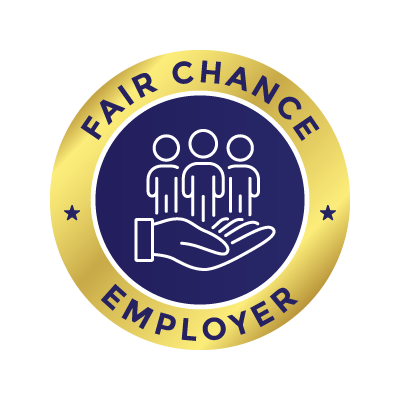“None of the opportunities that I have today would have happened if I didn’t show up. I might have been scared, I might have been frightened, I might not have wanted to do it, but I showed up. And because of that, opportunities came my way.”
Destiny Garcia is a force to be reckoned with. She is well-known in Utah for being a fierce, powerful, and fearless advocate for justice-involved people across the state. As a woman who has been through the record clearance process, and a person in long-term recovery herself, Destiny does not shy away from discussing her own experiences in the justice system.
about destiny
Destiny grew up in poverty. Her family depended on government assistance, and that had been true for generations. As a young child, Destiny was surrounded by drug use and violence. She believed this was normal and ended up in an abusive relationship herself. This abuse led to Destiny’s struggle with substance use. She found herself in and out of the emergency room to deal with significant physical injuries, each time being prescribed opiates to treat her pain.
Destiny and her two children were eventually able to escape her abusive relationship, but her addiction remained. During this time in her life, she lived with her mother. More than anything, Destiny wanted to move forward from her past traumas and focus on creating a better future for herself and her family. Eager to learn and ready to start a new chapter in her life, Destiny enrolled in college.
Unfortunately, Destiny’s college experience was cut short after she was arrested for retail theft. She was stealing to support her addiction. Upon being released from jail, Destiny became homeless. Living on the street and struggling, Destiny knew she did not want to be stuck in the revolving door of the criminal justice system forever. But she did not know where — or how — to get the help she desperately needed.
Despite cycling through the justice system, Destiny was never offered treatment or given the chance to achieve sobriety. That is, until she was arrested during Operation Rio Grande — a crackdown on crime in Downtown Salt Lake City. Due to increased funding for rehabilitation efforts, the police officer who arrested Destiny urged her to take advantage of the help she was offered. Soon after, she was admitted into a drug court program.

Entering a rehabilitation program was life changing for Destiny. She successfully completed inpatient treatment and was given a voucher from Salt Lake County to move into a sober living facility. But as part of the program, Destiny was required to find a job. After countless job applications and denials, she was finally offered a job that paid just over $8 per hour for ten hours a week of work. It cost her almost as much money to take the bus back and forth as she got paid each week. This was really frustrating. Even after successfully completing treatment, serving her sentence, and taking every step necessary to change her life, Destiny struggled to find a job that paid a livable wage.
Five months into her recovery journey, Destiny was asked to speak at a press event about some of the housing services introduced with Operation Rio Grande’s rollout. Destiny had never done anything like this before and was terrified to tell her story. However, her son urged her to do it, noting how many people going through a similar situation would benefit from hearing about her successes upon completing treatment.
A few months after the press event, Destiny was hired as a Front-Desk Receptionist at former Mayor Ben McAdams office. She was making more money than she had ever made in her life and decided to start the criminal record expungement process.
As a result of her graduation from drug court, she received a free lawyer, but was required to pay the government expungement fees in order to move forward, which in her case were more than $2,000. She was making $21 per hour, more money than she had ever made in her life, but she was still unable to afford it. At this point in her life, she was faced with a choice: pay her rent and keep her housing, or pay for the government fees and expunge her record. Destiny knew that a clear record would open more opportunities for her in life, which would allow her to better provide for her family, including her baby girl who was on the way. While it was a hard choice, Destiny chose to pay her rent. She didn’t want to become homeless again.
But to her surprise, she was still able to clear her record. After sharing her predicament with her colleagues, they raised the funds to cover the government fees needed to clear Destiny’s record. Today, Destiny is record-free. Her income has doubled and she became the first person in her family to become a homeowner.
Destiny worked at the Mayor’s office for five years before finding her current career as the Executive Director at Clean Slate Utah — an organization that educates people about Utah’s record clearance laws and assists them in representing themselves. She always knew she wanted to help those on their journey through the justice system and is proud to be where she is today. While she can’t say for sure what the future holds, she knows one thing: she will continue to share her story to raise awareness of the issues within our justice system and to advocate for criminal justice reform.
Destiny’s heart is full of appreciation for many friends, family members, and mentors who have helped her along the way. She is appreciative of her family, for standing by her in her darkest times; Mayor Ben McAdams for giving her chance when no one else would; her community for loving and standing by her through it all; and importantly — her biggest supporter — her son for believing in her, and for all he did, and continues to do to support her in recovery.
Destiny’s advice to those who are still on their journey through the justice system is to show up for yourself so you can show up for your family and community. She says, “None of the opportunities that I have today would have happened if I didn’t show up. I might have been scared, I might have been frightened, I might not have wanted to do it, but I showed up. And because of that, opportunities came my way.”
What are you waiting for?
It’s time to leave the past behind. Use our tool to quickly check if you have records that are eligible for expungement today!
Find out if you’re eligible in under 3 minutes.
This story is part of our #1in3 campaign, a project to end the stigma and raise awareness of how common it is to have a criminal record.
1 in 3 Americans has a criminal record, which is a lot more common than people think. No one expects to be involved in the justice system, but it can happen to anyone. People of all ages, backgrounds, genders, and income-levels are involved in the justice system. Their pathways vary, but the barriers of a record affect them all. Our hope is that by sharing their portraits and telling their stories, we can change the way people think about people with records and appreciate them for all they have overcome.




